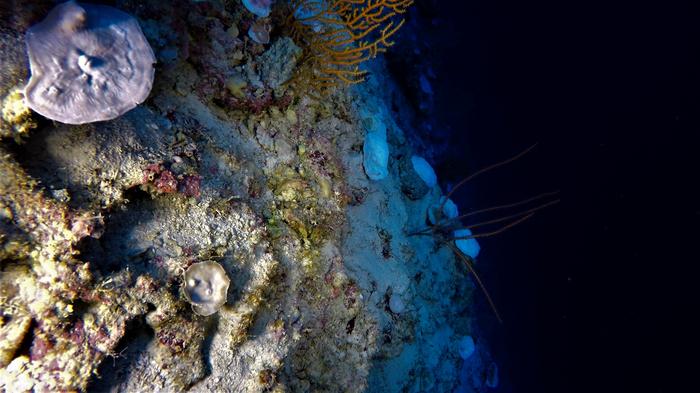Scientists have discovered the deepest known evidence of coral reef bleaching, more than 90 metres below the surface of the Indian Ocean.

Credit: University of Plymouth
Scientists have discovered the deepest known evidence of coral reef bleaching, more than 90 metres below the surface of the Indian Ocean.
The damage – attributed to a 30% rise in sea temperatures caused by the Indian Ocean dipole – harmed up to 80% of the reefs in certain parts of the seabed, at depths previously thought to be resilient to ocean warming.
However, scientists say it serves as a stark warning of the harm caused in our ocean by rising ocean temperatures, and also of the hidden damage being caused throughout the natural world as a result of climate change.
The findings, highlighted in a study published in Nature Communications, were discovered by researchers from the University of Plymouth.
Dr Phil Hosegood, Associate Professor in Physical Oceanography at the University of Plymouth and lead on the project, said: “There are no two ways about it, this is a huge surprise. Deeper corals had always been thought of as being resilient to ocean warming, because the waters they inhabit are cooler than at the surface and were believed to remain relatively stable. However, that is clearly not the case and – as a result – there are likely to be reefs at similar depths all over the world that are at threat from similar climatic changes.”
Researchers from the University have been studying the Central Indian Ocean for well over a decade, with their work supported by the Garfield Weston Foundation and the Bertarelli Foundation.
On their research cruises, they use a combination of in situ monitoring, underwater robots and satellite-generated oceanographic data to understand more about the region’s unique oceanography and the life it supports.
The first evidence of the coral damage was observed during a research cruise in November 2019, during which scientists were using remotely operated underwater vehicles equipped with cameras to monitor the coral health below the ocean surface.
Images from the underwater cameras were being transmitted live onto the research vessel, and gave the research team its first glimpse of the corals that had been bleached. Conversely, at the same time as the deeper reefs were bleaching, they observed shallow water reefs exhibiting no sign of harm.
Over the subsequent months, the researchers assessed a range of other data collected during the research cruise and information from satellites monitoring the ocean conditions and temperatures.
It highlighted that while temperatures on the ocean surface had barely changed during the period, temperatures beneath the surface had climbed from 22°C to 29°C due to the thermocline deepening across the equatorial Indian Ocean.
Clara Diaz, the lead author on the study, said: “What we have recorded categorically demonstrates that this bleaching was caused by a deepening of the thermocline. This is down to the regional equivalent of an El Nino, and due to climate change these cycles of variability are becoming amplified. Moving forward, bleaching in the deeper ocean here and elsewhere will likely become more regular.”
Dr Nicola Foster, Lecturer in Marine Biology and study co-author, added: “Our results demonstrate the vulnerability of mesophotic coral ecosystems to thermal stress and provide new evidence of the impact that climate change is having on every part of our ocean. Increased bleaching of mesophotic corals will ultimately lead to coral mortality and a reduction in the structural complexity of these reefs. This will likely result in a loss of biodiversity and a reduction in the critical ecosystem services that these reefs provide to our planet.”
Researchers from the University returned to the same areas during planned cruises in 2020 and 2022, and found that large parts of the reef had recovered.
In spite of this, they say, it is critically important to increase monitoring of the seafloor in the deep ocean, even if it is a hugely challenging and complicated undertaking.
With damage to shallow water corals increasing in frequency and severity, it had been expected that mesophotic corals – found between 30-150m under the surface – would plug the gap in terms of delivering ecosystem benefits.
However, this research highlights that may not be the case – and with deep water corals all over the planet remaining largely understudied, similarly damaging incidences of bleaching could be going unnoticed.
Dr Hosegood added: “The oceanography of a region is impacted by naturally occurring cycles that are becoming amplified by climate change. Currently, the region is suffering similar, if not worse, impacts due to the combined influence of El Nino and the Indian Ocean Dipole. While there is no way we can stop the thermocline from deepening, what we can do is expand our understanding of the impacts that these changes will have throughout these environments of which we have so little knowledge. In the face of fast-paced global change, that has never been more urgent.”
Journal
Nature Communications
DOI
10.1038/s41467-023-42279-2
Method of Research
Observational study
Subject of Research
Not applicable
Article Title
Mesophotic coral bleaching associated with changes in thermocline depth
Article Publication Date
16-Oct-2023




